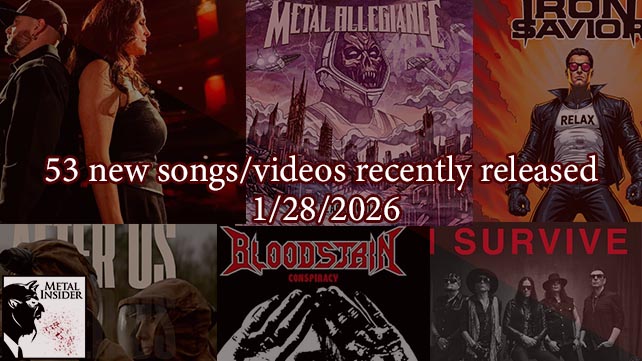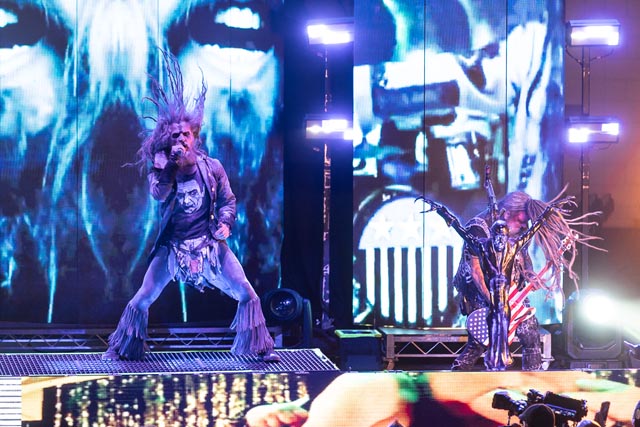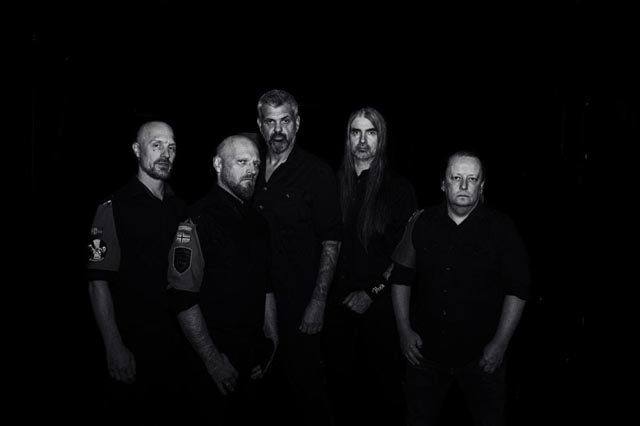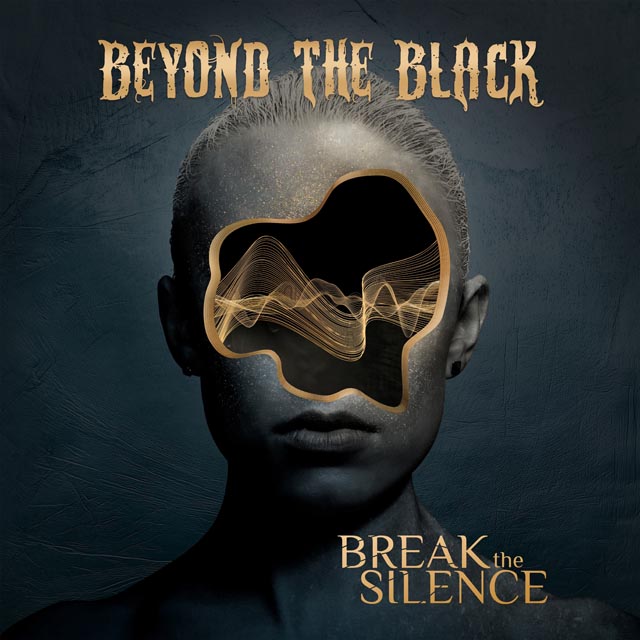 When we met Megadeth bassist David Ellefson last week at Vevo headquarters, he was about to do something he hasn’t done much before: play a three song acoustic set with the band in front of a small audience. As the bassist of the band, Ellefson has been with Megadeth for almost its whole career, so he’s had a great vantage point of the band’s highs and lows. We discussed Super Collider, the band’s first album on their own Tradecraft label, as well as this year’s Gigantour, their decision to include a cover song on the new album, and his advice for Motörhead frontman Lemmy.
When we met Megadeth bassist David Ellefson last week at Vevo headquarters, he was about to do something he hasn’t done much before: play a three song acoustic set with the band in front of a small audience. As the bassist of the band, Ellefson has been with Megadeth for almost its whole career, so he’s had a great vantage point of the band’s highs and lows. We discussed Super Collider, the band’s first album on their own Tradecraft label, as well as this year’s Gigantour, their decision to include a cover song on the new album, and his advice for Motörhead frontman Lemmy.
Let’s talk a little about Super Collider. It’s the first one on the band’s own label. Have you really noticed any difference?
I mean, the whole imprint idea is that we pretty much just put our logo on our own record [laughs], but we use the muscle of Universal Music Group around the world to push it out and to use all of their marketing and distribution, which is what you want. Anyone can start a label, but if you’re just selling them out of your Post Office box, you’re gonna sell about two copies versus having it distributed around the world. So major label distribution obviously makes all the difference in the world. And we noticed that when we went from Killing is My Business to the Peace Sells record years ago. We worked with Johnny K on the last record so we already had the getting to know each other experience on that record, that was kind of the first date and this was more digging into the songs on the record and had a good idea of what we were going into when we started it. And really the songs were laid out in October and we did the Countdown to Extinction 20th Anniversary tour, and by the time we were ready to start tracking at the end of December, we had a good road map of where we wanted to go and there were a lot of tunes that were already on the deck and ready.
It seemed like it came together very quickly. You were touring last year and all of a sudden there are pictures on Instagram and Facebook of you in the studio. Did it come together as quickly as it seemed to?
We’re a band now that is always on tour, so we always try to find little windows to make records in between [laughs]. So yeah, we were already laying out the record during the last world tour. And we knew once we were rolling off the road that we were going to go in and start tracking. January gave us the opportunity to write about six more tunes, which also included bringing in the cover song of “Cold Sweat.” We talked about a few ideas and it’s kind of cool to do. We’ve always done covers, for the most part, of bands that don’t really exist anymore, even Black Sabbath at the time didn’t exist when we did “Paranoid.” Nancy Sinatra, of course the Sex Pistols, you know, so at the time we were doing this, it was all artists from a past day. That’s what made the Thin Lizzy song a great tune, the fact that that lineup will never exist ever again I think made it cool for us to be able to take the torch and run with it.
What made you revisit doing a cover after so many records without any?
It’s one of those things where we put one on every record, Killing is my Business, Peace Sells, so you know, you don’t want to be known as “oh yeah here’s that obligatory cover track.” So we wanted to move away from it for a bunch of years and I think that was the reason we really hadn’t done one since our earliest records. So it was cool to pull one in there, it’s a different story now because now we’re very much established, where in the early days, you’re looking for an affiliation. I think, except for maybe “Anarchy,” I think the first couple of covers were very much Megadeth-ized. So I think now to do one it’s more like, “Here’s Megadeth legitimately covering a Thin Lizzy song in the exact arrangements, not having to Megadeth-ize it, other than it just sounds like Megadeth because it’s the four of us playing.”
And you’ve gotten to play it on stage with a bunch of people right?
Yeah we did. We did it a couple of times, Dallas was the first time. That was cool because it was a big radio show that [Dallas rock station KEGL] The Eagle was promoting down in Dallas. Slash happened to be on the bill that day. And Slash is the ultimate cool jam guy. He’s great at it. He knows what he’s doing, he’s a friend of ours for many, many years, so to bring him and Zakk [Wylde, Black Label Society], and Draiman [David, Device/Disturbed], Jason Newsted, and Vinny Paul [Hellyeah, Pantera] and all these guys up there, in a lot of ways it was the highlight of the tour to be able to bring everybody out. And Vinny is from Dallas, of course, so it was kind of a hometown thing for him as well.
Were you involved at all with bringing David Draiman into the recording sessions?
I’ve been a big fan of Disturbed ever since I was producing a demo for some friends in Minneapolis, and I walked out of the studio about midnight back in 2004 or 2005 maybe something like that, and I turned on the radio and I heard the first Disturbed single off of the Believe record, which was “Prayer.” And it just floored me, I mean it blew me away how great it was. And it reminded me very much of Countdown to Extinction type of production. Really tight percussive playing and I became a fan immediately. So I’ve always kind of kept track of what they’re doing. Two years ago we did the Mayhem Festival and they were on the bill and I kept talking them up and our Dave and their Dave became friends on that tour, which was really cool. So that is what led to them staying in touch and then that synergy that happened on the record. Of course Johnny K produced it as well as earlier Disturbed records so we were kind of finding ourselves as one big extended family. Really naturally and organically and that’s the best way I think for those kind of collaborations.
The idea of Gigantour this year was pretty innovative, in that all of the bands have been in other bands. Did you decide to do that or was there just a point where, all of a sudden, “wait a minute?”
It totally happened serendipitously. It was not something planned at all. There were a couple of groups talked about when the idea of Gigantour was tossed around. And I’m really glad with the way it came together the way it did because all of a sudden you look back at it like, “how did this happen?” And it is cool because everybody’s had big successes with other things, but yet they are very much men on their own two feet and they’re solidly standing behind new projects, I mean for Newsted, this is really his next new thing. As far as I know, Disturbed is not officially disbanded, so they kind of gave each other license to go out and do new things. And Zakk of course, we all love him just from Ozzy. And what they’ve created with Black Label Society is incredible, kind of like a takeoff from the Pantera lifestyle of this whole tribe uniting and its really impressive what they’ve done. Of course, Vinny with Hellyeah, he’s always just a good good friend and neighbor to all of us and his new group is great. It really came together with a lot of variety this year.
On the last Gigantour you toured with Motörhead. Lemmy has been undergoing some health issues. Do you have any advice for him?
Well, Lemmy has been a man on the edge and a man on the extreme from the very beginning. And Lemmy is Lemmy, and he’s given us everything he’s had from day 1. If that’s kind of how he likes to roll, I don’t think any of us can tell Lemmy anything [laughs].












